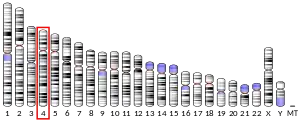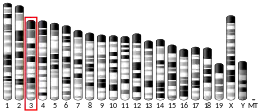ALPK1
Alpha-protein kinase 1 is an enzyme that in humans is encoded by the ALPK1 gene.[5][6][7]
| ALPK1 | |||||||||||||||||||||||||||||||||||||||||||||||||||
|---|---|---|---|---|---|---|---|---|---|---|---|---|---|---|---|---|---|---|---|---|---|---|---|---|---|---|---|---|---|---|---|---|---|---|---|---|---|---|---|---|---|---|---|---|---|---|---|---|---|---|---|
| Identifiers | |||||||||||||||||||||||||||||||||||||||||||||||||||
| Aliases | ALPK1, 8430410J10Rik, LAK, alpha kinase 1, ROSAH | ||||||||||||||||||||||||||||||||||||||||||||||||||
| External IDs | OMIM: 607347 MGI: 1918731 HomoloGene: 11849 GeneCards: ALPK1 | ||||||||||||||||||||||||||||||||||||||||||||||||||
| |||||||||||||||||||||||||||||||||||||||||||||||||||
| |||||||||||||||||||||||||||||||||||||||||||||||||||
| |||||||||||||||||||||||||||||||||||||||||||||||||||
| |||||||||||||||||||||||||||||||||||||||||||||||||||
| |||||||||||||||||||||||||||||||||||||||||||||||||||
| Wikidata | |||||||||||||||||||||||||||||||||||||||||||||||||||
| |||||||||||||||||||||||||||||||||||||||||||||||||||
Unlike most eukaryotic kinases, alpha kinases, such as LAK, recognize phosphorylation sites in which the surrounding peptides have an alpha-helical conformation.[supplied by OMIM][7]
References
- GRCh38: Ensembl release 89: ENSG00000073331 - Ensembl, May 2017
- GRCm38: Ensembl release 89: ENSMUSG00000028028 - Ensembl, May 2017
- "Human PubMed Reference:". National Center for Biotechnology Information, U.S. National Library of Medicine.
- "Mouse PubMed Reference:". National Center for Biotechnology Information, U.S. National Library of Medicine.
- Ryazanov AG, Pavur KS, Dorovkov MV (Mar 1999). "Alpha-kinases: a new class of protein kinases with a novel catalytic domain". Curr Biol. 9 (2): R43–5. doi:10.1016/S0960-9822(99)80006-2. PMID 10021370. S2CID 34505206.
- Nagase T, Kikuno R, Ishikawa K, Hirosawa M, Ohara O (Sep 2000). "Prediction of the coding sequences of unidentified human genes. XVII. The complete sequences of 100 new cDNA clones from brain which code for large proteins in vitro". DNA Res. 7 (2): 143–50. doi:10.1093/dnares/7.2.143. PMID 10819331.
- "Entrez Gene: ALPK1 alpha-kinase 1".
External links
- Human ALPK1 genome location and ALPK1 gene details page in the UCSC Genome Browser.
Further reading
- Nakajima D, Okazaki N, Yamakawa H, et al. (2003). "Construction of expression-ready cDNA clones for KIAA genes: manual curation of 330 KIAA cDNA clones". DNA Res. 9 (3): 99–106. doi:10.1093/dnares/9.3.99. PMID 12168954.
- Dias Neto E, Correa RG, Verjovski-Almeida S, et al. (2000). "Shotgun sequencing of the human transcriptome with ORF expressed sequence tags". Proc. Natl. Acad. Sci. U.S.A. 97 (7): 3491–6. Bibcode:2000PNAS...97.3491D. doi:10.1073/pnas.97.7.3491. PMC 16267. PMID 10737800.
- Strausberg RL, Feingold EA, Grouse LH, et al. (2003). "Generation and initial analysis of more than 15,000 full-length human and mouse cDNA sequences". Proc. Natl. Acad. Sci. U.S.A. 99 (26): 16899–903. Bibcode:2002PNAS...9916899M. doi:10.1073/pnas.242603899. PMC 139241. PMID 12477932.
- Ota T, Suzuki Y, Nishikawa T, et al. (2004). "Complete sequencing and characterization of 21,243 full-length human cDNAs". Nat. Genet. 36 (1): 40–5. doi:10.1038/ng1285. PMID 14702039.
- Yamada S, Ohira M, Horie H, et al. (2004). "Expression profiling and differential screening between hepatoblastomas and the corresponding normal livers: identification of high expression of the PLK1 oncogene as a poor-prognostic indicator of hepatoblastomas". Oncogene. 23 (35): 5901–11. doi:10.1038/sj.onc.1207782. PMID 15221005.
- Gerhard DS, Wagner L, Feingold EA, et al. (2004). "The Status, Quality, and Expansion of the NIH Full-Length cDNA Project: The Mammalian Gene Collection (MGC)". Genome Res. 14 (10B): 2121–7. doi:10.1101/gr.2596504. PMC 528928. PMID 15489334.
- Heine M, Cramm-Behrens CI, Ansari A, et al. (2005). "Alpha-kinase 1, a new component in apical protein transport". J. Biol. Chem. 280 (27): 25637–43. doi:10.1074/jbc.M502265200. PMID 15883161.
- Kimura K, Wakamatsu A, Suzuki Y, et al. (2006). "Diversification of transcriptional modulation: Large-scale identification and characterization of putative alternative promoters of human genes". Genome Res. 16 (1): 55–65. doi:10.1101/gr.4039406. PMC 1356129. PMID 16344560.
This article is issued from Wikipedia. The text is licensed under Creative Commons - Attribution - Sharealike. Additional terms may apply for the media files.




